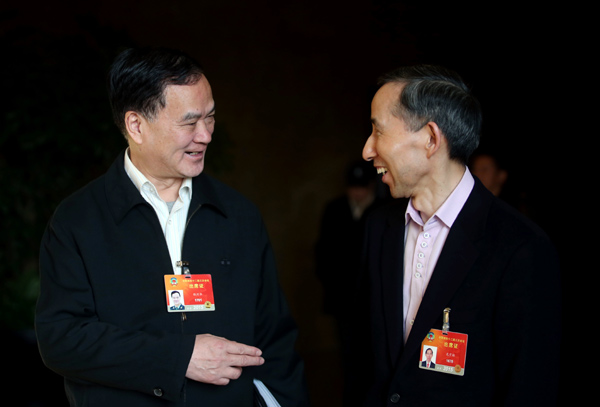General: Make military more transparent
 0 Comment(s)
0 Comment(s) Print
Print E-mail China Daily, March 11, 2015
E-mail China Daily, March 11, 2015
The military should be more open to the public by releasing appropriate navy and air force equipment information in a timely manner and setting regular military open days, a political adviser and senior officer suggested.
 |
|
At the CPPCC session on Tuesday, Major General Qian Lihua (left) speaks with adviser Long Yuxiang of China International Culture Communication Center. ZOU HONG/CHINA DAILY |
Major General Qian Lihua, a member of the Chinese People's Political Consultative Conference who once headed the foreign affairs office of the Ministry of National Defense, said he would submit two proposals during the two sessions aimed at bridging the information gap between the public and the People's Liberation Army.
"Compared with other countries, China's military is very open to domestic citizens and foreign visitors," Qian said. "However, the release of information doesn't keep pace with the rapid development of the Internet and the surging demand from the public."
Qian said he had been thinking about the proposals for almost two years. The feedback he collected from other CPPCC members was also favorable, he said.
"Sometimes big news about the military, including weapons and equipment improvements, didn't come through official channels but from overseas media," Qian said. "For example, media including Jane's Defence Weekly, Kanwa Information Center and Defense News released information about developments in China's navy and air force, triggering hot debate around the world."
Qian's proposal urged government bodies to set guidelines for news releases.
"Given the concerns of the public and media both at home and abroad under the current classification system, there should be a formal guideline about what kind of information should be released immediately, what kind of questions should be answered promptly and what kind of information should be handled with discretion," he said, summarizing the report.
"In addition, regular military open days inviting the public to visit the military barracks directly can also help to increase the understanding and unity of the army and people."
Senior Colonel Li Jie, a researcher at the Chinese navy's military academy, said the timing is good for making such a proposal.
"Basically, we release military information through a spokesperson; however, I think it is not enough," Li said. "A spokesperson cannot be an expert in all fields and cannot offer in-depth analysis of the trend behind the facts. Sometimes, their work is focusing on briefing the basic information.
"At the same time, the public wants to know more about military construction. The limited briefing and feedback cannot provide enough information, which leaves room for overseas media's analysis. From a communications perspective, this could cause misunderstandings."





